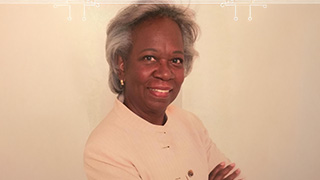Profiles of the Joseph A. Unanue Latino Institute Advisory Council: The Honorable Caridad Rigo '73, '77
Monday, November 25, 2024
 At the helm of the Joseph A. Unanue Latino Institute’s Advisory Council sits the Honorable Caridad Rigo ’73, ’77. Caridad arrived to the
United States from Cuba prior to Fidel Castro’s dictatorship and experienced the struggles
of the first generation American. This included language barriers, cultural differences
and formative figures who would frame their messaging in a manner that was intended
to steer her in what she “couldn’t do.” With the support of her family, Caridad attended
Seton Hall University and graduated with a bachelor of arts in political science.
She then worked in retail while attending the night school for Seton Hall Law. She
graduated with her Juris Doctorate in 1977.
At the helm of the Joseph A. Unanue Latino Institute’s Advisory Council sits the Honorable Caridad Rigo ’73, ’77. Caridad arrived to the
United States from Cuba prior to Fidel Castro’s dictatorship and experienced the struggles
of the first generation American. This included language barriers, cultural differences
and formative figures who would frame their messaging in a manner that was intended
to steer her in what she “couldn’t do.” With the support of her family, Caridad attended
Seton Hall University and graduated with a bachelor of arts in political science.
She then worked in retail while attending the night school for Seton Hall Law. She
graduated with her Juris Doctorate in 1977.
In the 1980’s Rigo noticed how Latinos were underserved and often misrepresented in the court system. In response, Rigo began her private practice as an immigration law attorney and then transitioned to juvenile, family and residential real estate law. In a time when there were only three to four Latino lawyers in Passaic County, she was a valuable resource who assisted Latinos in getting through life in north America.
Rigo spent over 10 years as a deputy attorney general representing the Division of Youth and Family Services. She was also a defense attorney and then ultimately was appointed to the office of Administrative Law where she was the first Latino judge to the court. She served in this role from 2003 to 2017 and then transitioned to part time until 2020. Judge Rigo has ruled on several precedent setting cases in the area of Special Education. One of the most notable was one that set a precedent that schools must advise parents to seek the help of a specialist, not diagnose, if a student has learning difficulties.
Now retired, Caridad has always been an active alumna. First, with the SHU Black Students Alumni Association where she got involved with the LEO program. It was then that she was introduced to President, Monsignor Sheeran who was in conversations about a Latino institute being created at the South Orange campus. Monsignor Sheeran would ultimately introduce her to Joseph A. and Carmen Ana Unanue who would invite her to be part of the founding advisory council.
As Rigo reflects on her many years of service she recognizes, “that no other organization can provide what the Latino Institute can provide; especially to those that might be straddling two cultures.” As she recounts her many contributions, she reaffirms her commitment to the Institute, “I want to be part of what I wish was there when I was a student at Seton Hall. I don’t look at college as just a place to learn a career, College should be all encompassing and should expose you to diverse people, concepts and thoughts. The Latino Institute provides that outlet and today, you can walk anywhere on that campus and everyone knows that there is a Latino Institute. It’s acknowledged and supported by University leadership and that is progress.”
Categories: Arts and Culture






